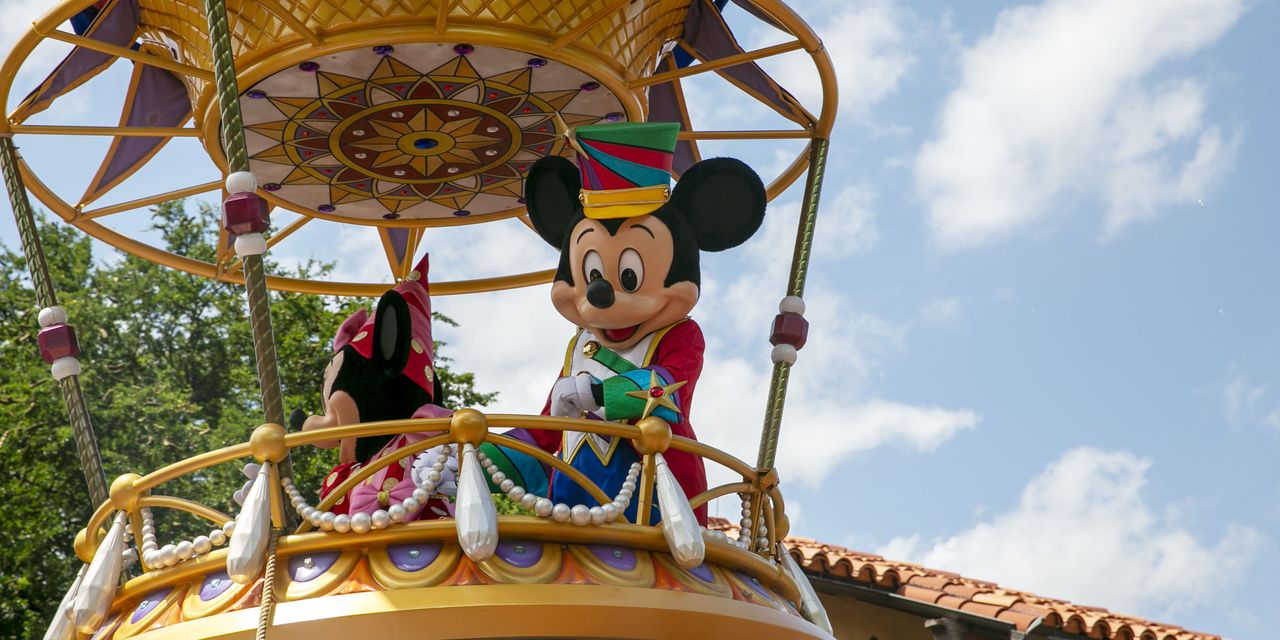

Escapism is paying off well for
though the entertainment giant itself can’t fully break free from the world that it inhabits.
Disney’s fiscal second-quarter results posted Wednesday afternoon topped Wall Street’s estimates in key business areas such as streaming, domestic theme parks and television advertising. Revenue for the fiscal second quarter ended April 2 rose 23% year over year to $19.3 billion, with operating income surging 50% to $3.7 billion. The company added 7.9 million subscribers to its Disney+ streaming service, which was 52% more than analysts had projected, while domestic theme-park revenue of $4.9 billion nearly equaled the prepandemic peak for that segment.
A strong report, in other words—especially given the cloud that has gathered over the streaming business in general after
surprised investors last month with a drop in paid subscribers for the same quarter. That suggested a possible ceiling for streaming services, with that market leader now around 222 million subscribers globally. But on Wednesday, Disney stuck to its plan to exceed that number for the Disney+ service by the end of its 2024 fiscal year.
Getting there won’t be a straight line, though. Chief Financial Officer
Christine McCarthy
said during Wednesday evening’s call that the company still expects subscriber additions in the second half of the year to exceed the number added in the first half, but she suggested the difference won’t be as high given the strength of recent additions. The company also warned that closures of its theme parks in Asia because of Covid-19 outbreaks could dent operating income in the third quarter. Disney’s share price, which initially rose 3% after the results, turned 3% lower following the call in after-hours trading.
Disney’s much larger domestic theme-park business was the real bright spot, with operating profit of nearly $1.4 billion—close to prepandemic levels and beating Wall Street’s forecasts by 18%. But that business also has now put Disney square in the middle of America’s culture war. The company’s belated opposition to Florida’s “Don’t Say Gay” law drove that state’s legislature to vote to kill Disney’s special taxing district, leaving open the question of who might be on the hook for nearly $1 billion in municipal bonds.
Disney avoided that topic on Wednesday’s call, and no analyst brought it up. But the politics of what is effectively Disney’s second home state are also roiling the company internally, with some now protesting the company’s plan to move about 2,000 employees of the theme-park division to Florida. That has created a fresh controversy for Chief Executive
Bob Chapek,
who already faced the dual challenges of inheriting control of the company at the onset of the pandemic while filling the shoes of a widely admired predecessor.
Even the happiest place on earth can’t seem to make everyone happy.
Write to Dan Gallagher at dan.gallagher@wsj.com
Copyright ©2022 Dow Jones & Company, Inc. All Rights Reserved. 87990cbe856818d5eddac44c7b1cdeb8
24World Media does not take any responsibility of the information you see on this page. The content this page contains is from independent third-party content provider. If you have any concerns regarding the content, please free to write us here: contact@24worldmedia.com

Common Mistakes When Using Athletic Field Tarps

High-Performance Diesel Truck Upgrades You Should Consider

Warehouse Optimization Tips To Improve Performance

Fire Hazards in Daily Life: The Most Common Ignition Sources

Yellowstone’s Wolves: A Debate Over Their Role in the Park’s Ecosystem

Earth Day 2024: A Look at 3 Places Adapting Quickly to Fight Climate Change

Millions of Girls in Africa Will Miss HPV Shots After Merck Production Problem

This Lava Tube in Saudi Arabia Has Been a Human Refuge for 7,000 Years

Four Wild Ways to Save the Koala (That Just Might Work)

National Academy Asks Court to Strip Sackler Name From Endowment

Ways Industrial Copper Helps Energy Production

The Ins and Out of Industrial Conveyor Belts